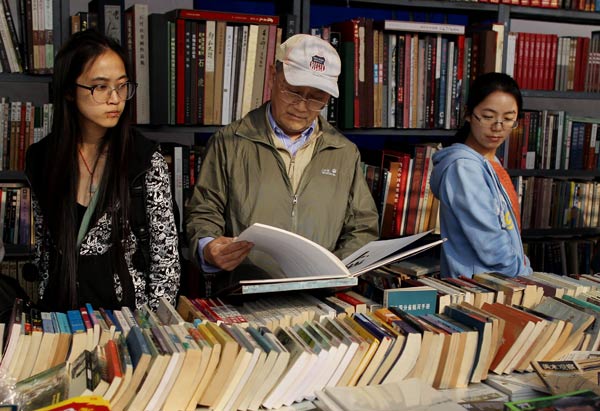

Enthusiasts browse the stalls at the Beijing Book Fair. ZHU XINGXIN / CHINA DAILY
Reading is becoming a fashionable, multiplatform social activity in China.
In recent months, social media sites have been deluged with posts bemoaning the decline of reading in China. But according to a new report, the harbingers of doom have been on the wrong page.
Contrary to the rumors, reading is not a dying pastime. If anything, more Chinese are settling down with a good book than ever before, albeit across a variety of platforms, and reading is becoming an increasingly fashionable social activity, according to the Chinese Academy of Press and Publication, which published its 11th National Reading Survey on Monday.
The report, which surveyed more than 40,000 people in 74 cities last year, found that Chinese readers got through 8.8 billion books, 600 million more than in 2012. And it seems they still can't get enough.
According to CAPP, which estimates that the Chinese book market is worth 46 billion yuan ($7.3 billion) per year, the average Chinese reader consumed 7.25 books in 2013 - about one-third in digital format.
In addition, they each read 70 editions of a newspaper and five magazines, spending 50 minutes a day reading online and 35 minutes on physical publications.
Meanwhile, e-reading made a real impression for the first time, with 50 percent of readers endorsing the format in 2013. To put that growth into perspective, in 2012 every person in China read 6.74 books on average.
The most popular subjects were literary works, closely followed by books about lifestyles. Meanwhile, provided the books are cheap enough, readers head to the bookstore twice a year on average to stock up on new material. Most readers thought 13.8 yuan was a reasonable price for a book. Those who don't read, less than 25 percent of the 1.3 billion population, blamed pressure of work for their failure to do so, and 50.8 percent of those interviewed said that at the end of every year they always regretted not spending more time reading.
"The change has been slow and steady, but the trend is clear when you look at it over the long term," said Xu Shengguo, a CAPP researcher who led the survey team. "I think it's an irrevocable trend now," he said. "We are reading more and more, so much that it may well become a lifestyle trend."
That may sound fanciful, but "Reading, my lifestyle", the slogan coined for a government-backed reading campaign that's often seen painted on walls and promoted via talks, is not entirely without foundation.
To boost the pastime, in the past year, the government has been working on a national regulation that will result in the allocation of funding and resources to promote reading for pleasure, as promised in this year's government work report.
"More than 800 million people have taken part in the reading campaign, but growth isn't easy," said Wu Shangzhi, director of the national reading campaign office at the State Administration of Press, Publication, Radio, Film and Television.
This week, to celebrate UNESCO's World Book Day on April 23, the authorities in Beijing and provinces such as Jiangxi, Guangdong, Shaanxi and Anhui, have been handing out free digital reading coupons, operating mobile libraries, offering popular works at discounted prices and conducting searches for "the most-bookish family".
"Getting reading on the government agenda has definitely helped make it a more popular choice. When you are part of a climate that celebrates the habit, it's hard not to get hooked," Xu said.
A rising social activity
In tandem with the rise in the number of books being consumed, reading is also becoming a fashionable, multi-platform social activity.
"We're human, so we will always be influenced by what other people do. People can't help reading what their friends are reading," Xu said.
As part of the growth of non-traditional reading platforms, WeChat, a social media service owned by Tencent, China's largest Internet portal, is taking advantage of this all-too-human foible.
"It's been transformational. WeChat makes it so easy to share your reading history," Xu said, adding that the platform has many advantages over traditional formats. "It delivers so many pieces that are colloquial, readable and fresh, such as transcripts of lectures. And it's free," he said.
Chinese choose new frontiers when reading
2014-04-22New chapter for Chinese reading habits?
2013-10-05Copyright ©1999-2018
Chinanews.com. All rights reserved.
Reproduction in whole or in part without permission is prohibited.